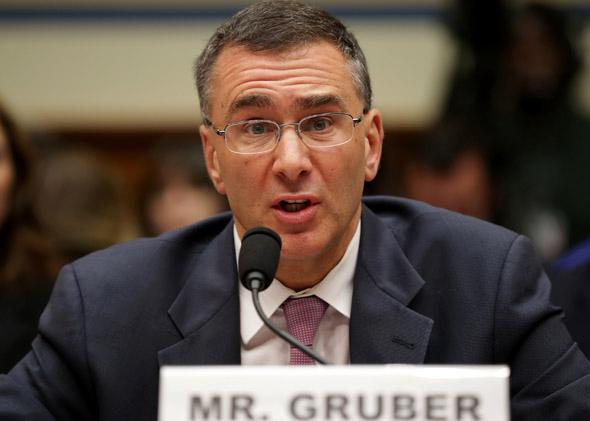Jonathan Gruber did not have a pleasant Tuesday morning. From 9:30 a.m. until nearly 2 p.m., the Affordable Care Act architect who infamously said the president’s signature legislation passed because of “the stupidity of the American voter or whatever” faced questioning from the House Oversight and Government Reform Committee. And some of the most blistering criticism came from Democrats.
Maryland Rep. Elijah Cummings, the top Democrat on the committee, tore into Gruber in his opening statement.
“As far as I can tell, we are here today to beat up on Jonathan Gruber for stupid—I mean absolutely stupid—comments he made over the last few years,” he opened.
Then he proceeded to do just that, calling Gruber’s comments “incredibly disrespectful” and “insulting.”
Rep. Stephen Lynch, a Democrat from Massachusetts who voted against the ACA, seemed to relish the opportunity to tear into Gruber. Other committee Democrats’ attitudes toward him ranged from highly irked to patronizing.
It had to be that way, for two main reasons. First, as Cummings noted more than once, Gruber has been a PR bonanza for Republicans, snidely affirming many of their worst suspicions about the passage of Obamacare. So for Democrats, there’s no value in trying to resuscitate Gruber’s reputation, and there’s no point in being nice to him. The damage he did is largely undoable, so they might as well throw him to the wolves.
But second, and more importantly, Democrats have to distance themselves from the substance of Gruber’s comments as well. Though he’s gotten the most press for his line about “the stupidity of American voters,” he also made numerous comments that counter the White House’s line on the how the ACA came together.
For instance, when Gruber said, “This bill was written in a tortured way to make sure [the Congressional Budget Office] did not score the mandate as taxes. If CBO scored the mandate as taxes, the bill dies. OK? So it’s written to do that. [If] you made explicit that healthy people pay in and sick people get money, it would not have passed.”
Yikes. There was also this: “I wish [economist] Mark [Pauly] was right that we could make it all transparent, but I’d rather have this law than not.”
And many other glib, brutally honest comments that you can watch in this two-minute video from the conservative group American Commitment. In the years since the bill passed, Gruber has torn through it, Tasmanian Devil-style, obliviously undermining plank after plank. So Democrats, naturally, were eager to cast him out into the dark, where there is weeping and gnashing of teeth. It’s probably not soon enough, though; Gruber is on the record, King v. Burwell is headed to the Supreme Court, and the damage is done.
“I think what Democrats on the committee did was extremely cowardly,” says Michael Cannon, director of health policy studies at the Cato Institute, “because everything Jonathan Gruber said about how this law was put together was true, and he knows it was true, and they know it was true. Jonathan Gruber was pilloried today for being the most honest architect of this law.”
But, Cannon adds, the hearing could have been worse for Gruber—if Republicans were better-informed about the law’s intricacies.
Cannon has written extensively about the upcoming Supreme Court argument that may determine Obamacare’s future. In that case, the plaintiffs argue that an IRS rule letting the federal government provide insurance subsidies to people living in states that don’t set up their own insurance marketplaces is illegal. Cannon and Case Western Reserve University law professor Jonathan Adler crafted that argument, as Vox details here.
One point Cannon and other ACA opponents make is that the legislation deliberately masks its real costs. At the hearing, Gruber was joined by two other witnesses: Centers for Medicare & Medicaid Services Administrator Marilyn Tavenner and independent contractor Ari Goldmann, who has pre-existing conditions and received health insurance he likes through the ACA.
During the hearing, Goldmann said he doesn’t receive a subsidy to help pay for his coverage. That’s where Cannon says Republicans on the committee dropped the ball.
Cannon argues that because of community rating in the law, health insurance is less expensive for people with pre-existing conditions and more expensive for people without them. That’s a de facto subsidy, says Cannon. And Gruber has made arguments along that line, too, as Cannon laid out in a piece in Forbes.
“It is very unfortunate that the Republicans on the committee are as economically illiterate as Jonathan Gruber seems to think they are,” he says. “They should have pounced on that.”
After the hearing concluded, Cummings told me he didn’t think Gruber said anything that would be helpful to the plaintiffs in King v. Burwell. On that point, Cannon concurs.
But it’s cold comfort for Democrats, who can’t ditch Gruber fast enough.
